| Release List | Reviews | Price Search | Shop | Newsletter | Forum | DVD Giveaways | Blu-Ray/ HD DVD | Advertise |
| Reviews & Columns |
|
Reviews DVD TV on DVD Blu-ray International DVDs Theatrical Reviews by Studio Video Games Features Collector Series DVDs Easter Egg Database Interviews DVD Talk TV DVD Talk Radio Feature Articles Columns Anime Talk DVD Savant HD Talk Horror DVDs Silent DVD
|
DVD Talk Forum |
|
|
| Resources |
|
DVD Price Search Customer Service #'s RCE Info Links |
|
Columns
|
 |
Man of the West |
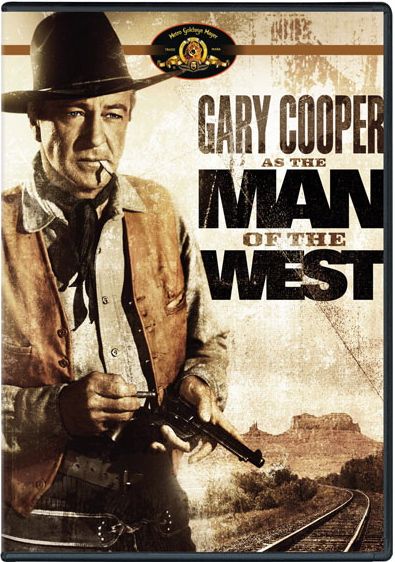
|
Man of the West MGM / Fox 1958 / Color / 2:35 anamorphic widescreen / min. / Street Date May 13, 2008 / 14.98 Starring Gary Cooper, Lee J. Cobb, Julie London, Arthur O'Connell, Jack Lord, John Dehner, Royal Dano, Robert Wilke, Frank Ferguson Cinematography Ernest Haller Art Direction Hilyard M. Brown Original Music Leigh Harline Written by Reginald Rose from a novel by Will C. Brown Produced by Walter Mirisch Directed by Anthony Mann |
Just getting started after moving their independent production banner from Allied Artists to United Artists, the Mirisch brothers continued to work with Billy Wilder while Walter Mirisch made a smart deal for a can't-miss western starring Gary Cooper. The script was by Reginald Rose, the hot writer of the TV and film hit 12 Angry Men. Mirisch also signed Anthony Mann, a commercially successful director just off a string of lucrative James Stewart westerns. Mann had bowed out of what was to be his next James Stewart project, Night Passage.
When critics began to focus on genre in the early 1970s, Man of the West acquired a lofty reputation as a genuine work of art, a distinction lost on its makers. The downbeat and grim tale of bad men trekking through a barren landscape pointed the way to later western idylls about "men who've outlived their time", but the film barely made a blip at the box office. Instead of a spirited, popular entertainment in the Jimmy Stewart mold, Mirisch got the humorless, classically-minded Anthony Mann of Devil's Doorway and The Furies. Man of the West is the bitter end of the 50s 'psychological' western. 1
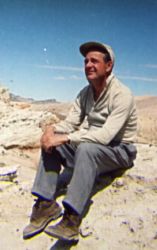
Anthony Mann's previous westerns were heavily influenced by their star James Stewart, who liked the richness of his guilty, morally compromised characters but was surely responsible for a constant creep of wholesome family values into their storylines. The films are Winchester '73, The Naked Spur, Bend of the River, The Far Country and The Man From Laramie. The relative darkness of the first entries eventually give way to conservative reassurance, with miners and farmers overcoming villains to form happy communities and Stewart winning a place in society. Night Passage shows us what happened when Stewart went on his own without Mann; the film's tough-minded story is smothered under a thick coating of sentiment and accordion solos.
A complete departure from that trend, Man of the West is a western ahead of its time, a moody treatment of dark father figures and the nature of evil. Lee J. Cobb's Dock Tobin is a killer nearing his dotage, riddled with delirious ideas and bad judgments but still powerful enough to run a band of cretins and sadists. Tobin bursts forward with operatic explosions of excitement, whether for crimes of the past ("You remember? You held him and I blew the top of his head off!") and dreams of loot to come ("Lasso! The name goes 'round and 'round in my head like a bell!"). The bandits move through a grassy but almost featureless landscape, eventually coming to a ruddy desert that seems incapable of supporting life. Expressing a theme later swallowed whole by Sam Peckinpah, Man of the West implies that the days of Tobin and his thieves are closing fast. Their fearsome reputation remains, but Dock wails that they can't even pull off a competent railroad holdup: "One stinkin' guard -- and you let it get away!" Three of the gang are too stupid to realize that Dock is living in a fantasy of soft banks and glorious killings. Cousin Claude should know better but considers Dock a glorious father figure and supports him out of personal loyalty. The prodigal Link is a 'link' to civilization, or perhaps to the savage past. He must pretend to be a willing partner in crime, to somehow save Billie and Sam.
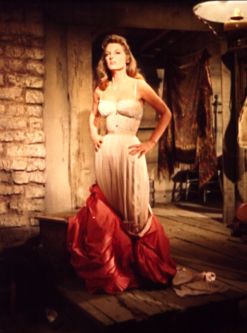
Anyone who knows Sam Peckinpah's films will immediately recognize Man of the West as cut from the same bloody cloth. The train robbery is similar to the one in The Wild Bunch, and the pervading theme of violent men outliving the wilder times of the early frontier is soaked through all of Peckinpah's films. Man of the West has grit and a gnawing sense of violent futility. The pace is slow, but several of the set pieces are true classics. The outlaws' reaction to seeing Billie is coarse and direct: "Look at the build on her!" Coaley holds a knife to Link's throat, drawing blood, and orders Billie to take her clothes off. Outraged but terrified, Billie has no choice but to comply. The perversely erotic scene puts the lie to an entire generation of Hollywood bad men, the kind that threaten virginal maidens but act impotent or stall when their chance finally comes.
The final shootout is also a revelation. We're expecting a standard ritualized six-gun confrontation, but Link must instead deal with a pair of killers outflanking him in a rotting ghost town, a fitting arena for 'ghost' outlaws. Mann uses his wide screen to communicate spacial relationships as Ponch and Claude creep at Link from different directions. The tense stalking scene pays off with Anthony Mann's characteristic emphasis on bodily violence we can feel: a man dies in a claustrophobic crawlspace, jumping as he's shot several times at close range.
Other indelible events express the misery and horror of meaningless death. Link cannot keep a frightened woman from being murdered. The mute Trout stumbles down a deserted street, wailing like a dying banshee. These outlaws are becoming extinct, like the dinosaurs of Fantasia.
As much as we admire Man of the West, its flaws are not difficult to see. Gary Cooper's 'good guy' persona is so strong, it's difficult to accept that the gentle Link Jones could ever have been a sadistic killer, pushing people's "guts out through their backs." The character is also mildly inconsistent, at first behaving more like a tenderfoot
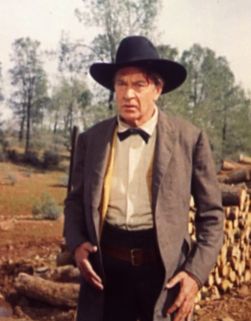 bumpkin than a man who was once a hardened criminal Do ex-criminals undergo total personality changes? The meek Link becomes skittish at the sight of a train. Most of Link's dialogue is way above the norm of 50's westerns, so why didn't Mann and Rose realize that his final lines to Dock Tobin are unintentionally funny? Dock is wheeling about in a demented state atop a sandy cliff. Link has just seen what the old monster has done to Billie. But his words boil down to a generic, "I'm takin' you in, Dock!" There's always some joker in a screening that thinks Trout's demise is funny, but audiences constently laugh when Link's words deflate the considerable tension built-up by the ending.
bumpkin than a man who was once a hardened criminal Do ex-criminals undergo total personality changes? The meek Link becomes skittish at the sight of a train. Most of Link's dialogue is way above the norm of 50's westerns, so why didn't Mann and Rose realize that his final lines to Dock Tobin are unintentionally funny? Dock is wheeling about in a demented state atop a sandy cliff. Link has just seen what the old monster has done to Billie. But his words boil down to a generic, "I'm takin' you in, Dock!" There's always some joker in a screening that thinks Trout's demise is funny, but audiences constently laugh when Link's words deflate the considerable tension built-up by the ending.
Mann's blocking of scenes is clean and economical. His crane work is better than Delmer Daves and his dramatic interior scenes are more fluid than Budd Boetticher. Mann relies less on cutting than Peckinpah, often using a single shot to carry an entire scene. The old Mexican miner finding his wife Juanita, for instance, holds the image of Link riding away, guilty for the misery he's been unable to forestall.
The movie has some serious shortcomings that may have been the result of budgetary limits -- Walter Mirisch was still not that far removed from his Allied Artists days. The ghost town of Lassoo is Burl Ives' ranch from The Big Country, presumably repurposed to save money. That's probably why the relatively distant Red Rock Canyon location figures so heavily in Man of the West's other-worldly final setting. What the film really lacks is a concrete representation of Good Hope, the town that accepted an outlaw who wanted to reform. We need to see Link's wife and kids waving goodbye as he heads out to meet his destiny. The final scene just doesn't have final-sounding dialogue, which makes us think that the original plan might have been to dissolve back to a shot of Link returning to Good Hope safe and sound. The movie begs for this kind of symmetry. A Savant article from 1998 discusses the rather close relationship between this film and Clint Eastwood's Unforgiven.
Leigh Harline's generic western score mirrors some of the film's darker moods, but the heroic-sounding main theme reinforces the Gary Cooper good-guy connection with counterproductive results. The optimism of the main titles and the last shot just doesn't seem part of the same movie.
That said, Man of the West's impressive strengths far outweigh its flaws. Once Cooper feels himself drawn into his old role, he gives us hardened stares and anguished looks that definitely prefigure the wounded, conflicted heroes in Sam Peckinpah films. Julie London handles the more adult material with dignity, especially considering that more than half of the film exploits her status as a potential rape victim. Lee J. Cobb is magnificent as a wooly, demented egomaniac, an outsized figure to compare with Walter Huston in Anthony Mann's The Furies. Arthur O'Connell is a little forced and obvious, but sufficiently observant to realize that Link may indeed be reclaiming his older, vicious self. Tobin's bad men are played to the hilt by actors willing to emphasize total depravity. Not until The Wild Bunch would outlaws surpass these guys for basic gnarly-ness. Jack Lord's Coaley is a smiling creep, a precursor of spaghetti western villains to come; Link literally disassembles Coaley, stripping him of his fake masculinity. But the madness of Dock Tobin dominates. At one point Tobin tells Trout what to do about Link: "After you leave the bank --- Kill Him." The line would become Pike Bishop's (and Sam Peckinpah's) signature in The Wild Bunch ten years later.
Coming soon to DVD will be Anthony Mann's epic remake of Cimarron, the link between the director's westerns and his later epics El Cid and The Fall of the Roman Empire. The epics are dazzling achievements, but Mann's contribution is sometimes buried under all the pageantry.
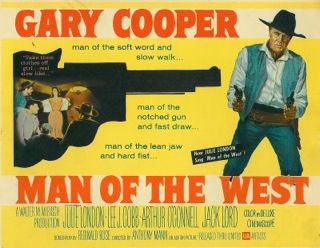
MGM / Fox's DVD of Man of the West is a good rendition of a movie with color issues. Until the 1990s the show was limited to frustrating Pan-Scan TV prints and an MGM VHS release. TCM shows the film letterboxed but this diligent new transfer is cleaner and improves on the color palette. A faded original negative unfortunately limits what can be done, and some of the early scenes have a slightly cold tinge that I don't remember seeing before. However, the sharpness and CinemaScope compositions look better than ever, and the slight fading results in red blood that really jumps out at us -- either that, or the movie is bloodier than I remember. Audio is good, with a couple of passages where dialogue sounds a bit compressed. I've seen earlier Region 2 transfers, and this one is far, far better. No trailer is included. We're grateful that Fox is giving us such a healthy batch of desired titles in the next two weeks, so perhaps we shouldn't complain about the absence of consumer friendly video gravy.
If the legal ownership / curatorship responsibility issues for Gary Cooper and Maria Schell's superb The Hanging Tree can be cleared up, we'd love to see that beloved film in video circulation again. And don't forget the great Robert Mitchum Technicolor beauty The Wonderful Country, which appears to be stalled over a tiny music rights question. Until then, hardcore western aficionados can savor Anthony Mann's classic in MGM's attractive presentation.
On a scale of Excellent, Good, Fair, and Poor,
Man of the West rates:
Movie: Excellent
Video: Excellent -
Sound: Very Good ++
Supplements: nada
Packaging: Keep case
Reviewed: May 14, 2008
Footnote:
1. A note from Richard Dinman: Glenn, United Artists thought so little of Man of the West that they dumped it into multiples with no Broadway opening. This was the one and only Cooper film without an exclusive Broadway engagement. --- RD
Return
Reviews on the Savant main site have additional credits information and are more likely to be updated and annotated with reader input and graphics.
Review Staff | About DVD Talk | Newsletter Subscribe | Join DVD Talk Forum
Copyright © MH Sub I, LLC dba Internet Brands. | Privacy Policy | Terms of Use
Subscribe to DVDTalk's Newsletters
|
| Release List | Reviews | Price Search | Shop | SUBSCRIBE | Forum | DVD Giveaways | Blu-Ray/ HD DVD | Advertise |





